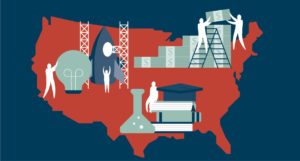These days it’s getting increasingly more difficult to tell true facts from fiction or hearsay.
There is a lot of news and information being published to trust just one source. And sources are not always impartial.
At the same time, we as professionals have less and less time to cross-check the information we’re given.
Tough as it may seem, that’s exactly what you must do .
No matter where you are in the business and professional world, you have to do your “homework” and check various sources to make sure you’re standing on solid facts.
What I look for
In my role as a leader of leaders, the people who impress me the most are those who’ve not just researched issues thoroughly but who‘ve also anticipated questions and conducted additional due diligence to answer them convincingly.
Those are the people who are most likely to succeed the right way and are the ones in whom I’ve entrusted the toughest, most rewarding assignments.
Remember to forget
And it doesn’t stop with learning.
Unlearning, that is, letting go of what is no longer valid, is just as important.
I’ve seen some of the best people and organizations make huge mistakes because they failed to acknowledge a new fact and let go of one that was no longer true.
You must remember to forget things that are no longer valid. If they stay there, they will continue to influence your thinking.
Worse. They will keep you from seeing the possibility of the new.
When was the last time you checked?
Let me share an example. It’s not unusual for the executive suite to receive calls from customers who have not been able to get a problem resolved through the normal channels.
In this case, it involved poor wireless coverage in a specific area of town.
I contacted the engineering team responsible for that area and asked what was the problem. They said there was no place in the neighborhood to place a cellular tower.
“When was the last time you looked?” I asked.
It turns out it had been one or two years. I thought that was a long time and suggested they re-drive the area to see if things had changed.
They did and found out that things had indeed changed.
The city was building a new water tower to which we could attach radios and a cellular antenna and, with that, significantly improve coverage.
This is what I mean by learning to unlearn. That engineering team had been operating based on what they knew. But what they knew was no longer valid.
Had we not double-checked and learned the new facts, we could have made it easy for a competitor to come in and serve our until-then unhappy customers.
Spotting trends early and detecting change
One of the biggest challenges leaders face today is keeping up with changes in patterns, whether they are technology, regulation, customer preferences or even demographics.
Where there is change there is opportunity. But only for those who can see the change early and react to it before competitors do.
And that involves doing research.
My own research example
I want to share a very recent example.
Lately I’ve become concerned about what I perceive to be erroneous information being shared about Hispanics.
So I decided to look into the facts for myself.
Fortunately, there is a vast amount of new data available, thanks to the great work of organizations such as the Pew Research Center, the U.S. Bureau of Labor Statistics, Stanford University’s Graduate School of Business, and the Latino Donor Collaborative*.
Even for someone who is very familiar with the U.S. Hispanic market, the new research findings revealed a set of facts that were new to me, which underscores my point that you never know what you don’t know until you do your homework.
These were in the areas of economic contribution and education. I’ll share them briefly:**
- The new findings show that, far from being an economic burden, the 55 million Latinos who lived and worked in the U.S. in 2015 added $2.13 trillion to the U.S. GDP (Gross Domestic Product), contributing greatly to the growth and vitality of the U.S. economy. In fact, if the U.S. Latino population had been an independent economy at that time, it would have ranked the seventh largest in the world. Greater than India, Brazil, or Canada.
- And when it comes to education, facts now show that Latinos are making very good progress. The Latino high-school dropout rate is at an all-time low while the Latino college enrollment is at an all-time high.
[These are just a couple of data points about the changing Hispanic demographics, but the amount of data available is extensive. I wrote a more comprehensive article on this subject for the July/August 2018 issue of Latino Leaders Magazine, and included 3 Infographics on economic impact, educational attainment, and entrepreneurship. You can download them for free from my website.]
One of the lessons here is that, even if you are an experienced leader, you may be surprised by what you learn when you double-check the information you assumed to be true.
The other lesson is that if you are not familiar with the new facts, you may not be able to make informed projections for the future.
Informed projections
Long-term decisions are very critical to business success.
In order to make predictions about the future, one should have a good set of facts about the past.
It’s not that past data will give you an indication of what the future may hold. But it does give you a base from which to forecast the future by projecting the changes that you are expecting on what happened in the past.
Research will set you free
All this reminds me of that great quote “The drudgery of the numbers will set you free to make intelligent decisions.”**
That quote has never been more relevant than in today’s complex environment, when it’s getting increasingly more difficult to figure out what are the true facts.
So, before you go to the next meeting, before you make that important proposal, take the time to conduct more research, dig a little deeper. Make extra sure that the information you share with your boss, your shareholders, and your employees, is solid, particularly if it’s needed to make future projections.
Winners do their research, do their homework, anticipate questions and know the answers. In doing so, they are able to seize opportunities that those less-diligent are likely to miss.
(*) The Latino Donor Collaborative, a non-profit 501(c)(3) organization of which I am a member, works to reframe and advance an accurate perception, portrayal and understanding of the important contributions Latinos make to American society.
(**) By former ITT President Harold Geneen in his book Managing



